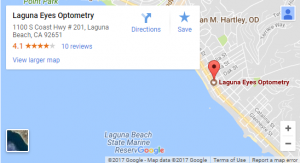
In Laguna Beach, patients often ask if sunglasses are just for sunny summer days. The truth? Sunglasses should be part of your daily routine—no matter the season. One patient even came in mid-winter with red, irritated eyes and light sensitivity. He hadn’t worn sunglasses in months, thinking they weren’t necessary during cloudy or colder months. Turns out, UV exposure doesn’t take a holiday.
Here’s why sunglasses deserve a year-round spot in your eyewear rotation.
UV Exposure Happens Every Season
Many people associate UV rays with hot summer sun, but harmful UVA and UVB rays are present even on overcast days—and especially in high-glare environments like snow or water.
Here’s what year-round UV exposure can lead to:
- Photokeratitis (sunburned eyes), especially from snow glare
- Increased risk of cataracts and macular degeneration
- Pinguecula and pterygium—growths on the white of the eye
- Long-term damage to the cornea and retina
Even in winter, snow can reflect up to 80% of UV rays back into your eyes. Compare that to beach sand at around 15%. Sunglasses aren’t about brightness—they’re about protection.
Glare and Eye Strain Aren’t Just Summer Problems
During fall and winter, the sun sits lower in the sky, creating more direct glare during morning and evening commutes. This low-angle light can cause you to squint and strain, even if it’s not especially bright outside.
If you’ve ever driven into the sunrise or sunset and found yourself constantly blinking or shifting your head to see clearly, you’ve experienced this firsthand.
Wearing polarized sunglasses can:
- Cut glare from roads, snow, and water
- Reduce squinting and headaches
- Help your eyes stay relaxed and focused
Sunglasses Offer More Than UV Protection
A high-quality pair of sunglasses does more than block UV rays:
- Wind protection in colder months helps prevent dry eyes
- Acts as a barrier to dust, pollen, and airborne irritants
- Reduces exposure to blue light from sunlight, especially in high-glare areas
Plus, if you wear contact lenses, sunglasses offer another layer of protection, keeping debris out of your eyes and lenses more stable on windy days.
What to Look for in Year-Round Sunglasses
Not all sunglasses are created equal. Look for:
- High UVA/UVB protection (Always check the label)
- Polarized lenses to reduce glare and improve contrast
- A comfortable wraparound frame that shields from the sides
- Optional photochromic lenses that adjust automatically to light levels—ideal for changing seasons
If you wear prescription glasses, prescription sunglasses or transition lenses can help you stay protected year-round without sacrificing vision clarity.
How Laguna Eyes Optometry Can Help Protect Your Eyes All Year
Sunglasses aren’t seasonal accessories—they’re essential eye health tools. At Laguna Eyes Optometry, we help patients find lenses that suit their lifestyle, whether you spend your time on the road, at the beach, or in the snow.
Book an eye exam at our practice in Laguna Beach to check your eye health and find the right sunglasses for every season.



Open 1 select saturday a month, please call to find out.